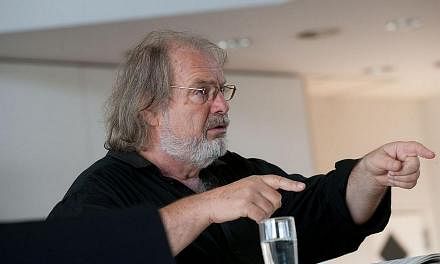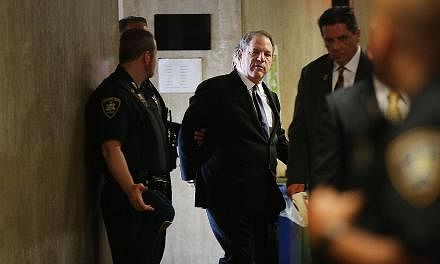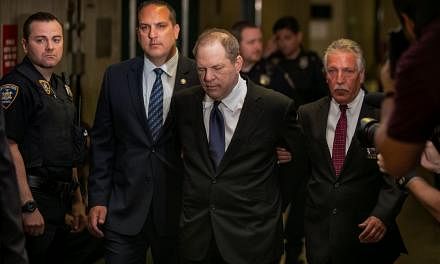NEW YORK (THE NEW YORK TIMES) - The Metropolitan Opera suspended James Levine, its revered conductor and former music director, on Sunday (Dec 3) after three men came forward with accusations that Mr Levine sexually abused them decades ago, when the men were teenagers.
Peter Gelb, the general manager of the Met, announced that the company was suspending its four-decade relationship with Mr Levine, 74, and cancelling his upcoming conducting engagements after receiving questions from The New York Times on Sunday about the accounts of the three men, who described a series of similar sexual encounters beginning in the late 1960s. The Met has also asked an outside law firm to investigate Mr Levine's behaviour.
"While we await the results of the investigation, based on these news reports the Met has made the decision to act now," Mr Gelb said in an interview, adding that his actions had the support of the Met's board. "This is a tragedy for anyone whose life has been affected."
The accusations of sexual misconduct stretch back to 1968.
Chris Brown, who played principal bass in the St. Paul Chamber Orchestra for more than three decades, said that Mr Levine masturbated him that summer - and then coaxed him to reciprocate - when Mr Brown was 17 at the Meadow Brook School of Music in Michigan, where Mr Levine was a 25-year-old rising star on the summer program's faculty. James Lestock said that Mr Levine also masturbated him there that summer when Mr Lestock was a 17-year-old cello student - the first of many sexual encounters with Mr Levine that have haunted him. And Ashok Pai, who grew up in Illinois near the Ravinia Festival, where Mr Levine was music director, said that he was sexually abused by Mr Levine starting in the summer of 1986, when Mr Pai was 16 - an accusation he made last year in a report to the Lake Forest Police Department in Illinois.
"I don't know why it was so traumatic," Mr Brown, who is now 66, said in a recent interview at his home in St. Paul, Minnesota, fighting tears at the memory, which said he was moved to share as part of the national reckoning over sexual misconduct. "I don't know why I got so depressed. But it has to be because of what happened. And I care deeply for those who were also abused, all the people who were in that situation."
Told of the accusations, a spokesman for Mr Levine declined to comment on Sunday night.
Speculation surrounding Mr Levine's private life has swirled in classical music circles for decades as he rose to a position of unprecedented prominence at the Met, leading more than 2,500 performances there. Though he stepped down as music director last year after a long struggle with health problems, Mr Levine had been scheduled to lead a highly anticipated new production of Puccini's "Tosca" starting New Year's Eve and two other productions in coming months.
But now the Met - the nation's largest performing arts organisation and one of the world's most prestigious opera houses - finds itself in the position that Hollywood studios, television networks and newsrooms have confronted in recent weeks, answering questions about what it knew about allegations of sexual misconduct made against one of its stars, and what actions it did and did not take.
Mr Gelb said that allegations about Mr Levine had reached the upper levels of the Met's administration twice before, to his knowledge.
One was in 1979, when Anthony A. Bliss, who was then the Met's executive director, wrote a letter to a board member about unspecified accusations about Mr Levine that had been made in an unsigned letter.
"We do not believe there is any truth whatsoever to the charges," Mr Bliss wrote in the letter, a copy of which was obtained by The Times, which said the Met had spoken "extensively" with Mr Levine and his manager. "Scurrilous rumours have been circulating for some months and have often been accompanied by other charges which we know for a fact are untrue." (Mr Bliss died in 1991 and there is no record of the original, unsigned letter, so the specific accusations against Mr Levine in it remain unclear.)
And then in October of 2016, after Mr Levine had stepped down from his position as music director, Mr Gelb said he was contacted by a detective with the Lake Forest Police asking questions about Mr Pai's report.
Mr Gelb said that he briefed the board's leadership and that Mr Levine denied the accusations. The company took no further action, waiting to see what the police determined. Then, on Saturday, the Met decided to investigate Mr Levine after media inquiries about his behaviour with young men.
Mr Gelb said that the Met had appointed Robert J. Cleary, a partner at the Proskauer Rose law firm who was previously a United States attorney in New Jersey and Illinois, to lead its investigation.
The men coming forward now said that some of the abuse started years ago, at the beginning of Mr Levine's career, and that this sort of behaviour had been widely rumoured in music circles.
Mr Brown, the former bass player in the St. Paul Chamber Orchestra, said that he had been surprised in the summer of 1968 when Mr Levine made him principal bass at Meadow Brook, given that Mr Brown was only 17 and just out of junior year of high school, while other players were older and more experienced. He said that he was initially flattered when Mr Levine, the conductor of the school's orchestra and the director of its orchestral institute, began to invite him to his dorm room late at night.
At their third meeting, Mr Brown said, Mr Levine began talking about sex.
"At that point I think it was basically a combination of fatigue and being young that allowed me to go to the bed - it was the bottom bunk - and have him masturbate me," Mr Brown said. "And then, almost immediately, he asked for reciprocation. And I have some very, very strong pictures in my memory, and one of them was being on the floor, and he was on the bottom bunk, and I put my hand on his penis, and I felt so ashamed."
"The next morning I was late to rehearsal," said Mr Brown, who had been raised a Christian Scientist and recalled that he had received little sex education. "I was in a complete daze. Whatever happens when you get abused had happened, and it wasn't just sexual."
At their next meeting, Mr Brown said, he told Mr Levine that he would not repeat the sexual behaviour, and asked if they could continue to make music as they had before.
"And he answered no," Mr Brown said, adding that Mr Levine hardly looked at him for the rest of the summer, even while conducting him. "It was a terrible, terrible summer." (That fall, after he returned for his senior year of high school, at the Interlochen Arts Academy, Mr Brown told his roommate about Mr Levine's sexual advances at Meadow Brook, the roommate confirmed in an interview.)
Mr Lestock, the teenage cello student at Meadow Brook, said in a telephone interview that he had a similar experience that summer in Mr Levine's dorm room.
"During the discussion, he suggested that I take my clothes off, because this would be natural and honest and expand my outlook on the world," Mr Lestock said. "My initial response included the word 'no.' I was not interested in that. But he ignored that, and pursued the point, and convinced me to let him masturbate me."
Mr Levine at that point was also an assistant conductor at the Cleveland Orchestra, and was surrounded by a tight-knit clique of musicians who were awed by him and followed him as his career took off. Mr Lestock joined that group, whose members studied music together, travelled together, ate together, and sometimes lived together. But he said that over the years he was sometimes subjected to humiliating sexual encounters with Mr Levine.
At one point in Cleveland, where he moved in 1969 to study at the Cleveland Institute of Music, he said that Mr Levine encouraged the members of the group to put on blindfolds and masturbate partners they could not see. They did, Mr Lestock said.
"This was the extent to which he had control," Mr Lestock said. Another member of the group, who spoke on the condition of anonymity to guard his privacy, said that he had also taken part in a blindfolded masturbation session.
A few years later, in a hotel near the Ravinia Festival, Mr Lestock said that Mr Levine caused him physical pain, telling him that he should "expand" his "range of emotions" and pinching him - repeatedly and hard - on his legs.
"Once I started to break down and cry, he continued to try to hurt me," Mr Lestock said of Mr Levine, who was music director of Ravinia from 1973 through 1993.
But Mr Lestock said he felt powerless to leave. "If I had left the group at the point, I would have had no career, no income, no friends, and have been totally alone in the world," he said. After following Mr Levine to New York in the early 1970s, Mr Lestock, who is now 67, eventually left the group, and music.
Mr Pai said that he first met Mr Levine when he was four years old and his parents took him backstage after a Ravinia concert. In 1985, when Mr Pai was 15, he said, Mr Levine gave him a ride home and began holding his hand in an "incredibly sensual way." The following summer, he said, Mr Levine touched his penis in a hotel room near the festival, beginning what he described as years of sexual encounters.
"I was vulnerable," said Mr Pai, who is 48. "I was under this man's sway, I saw him as a safe, protective person, he took advantage of me, he abused me and it has really messed me up."
He said that the relationship continued for years and that his feelings were complicated: He shared a copy of a Western Union Mailgram he had sent to Mr Levine at the Salzburg Festival in 1988 that contained the postscript "P.S. I love you." But Mr Pai came to realise that, in those early years, he had been too young to give consent.
Speculation about Mr Levine's private life has occasionally come into public view. In 1987, Mr Levine dismissed talk of wrongdoing in an interview with The Times, saying that "both my friends and my enemies checked it out and to this day, I don't have the faintest idea where those rumours came from or what purpose they served."
A decade later, more rumours circulated in Germany, when politicians and media outlets debated his appointment to become the music director of the Munich Philharmonic, beginning in 1999. In an interview in The Times in 1998, Mr Levine declined to respond to the speculation.
"I've never been able to speak in public generalities about my private life," he said.
Officials at Ravinia, where Mr Levine is scheduled to begin an ongoing annual residency next summer, said on Sunday that they first learned of the accusations through the media this weekend. "Ravinia finds these allegations very disturbing and contrary to its zero-tolerance policies and culture," Allie Brightwell, its media manager, said in an email. "Ravinia will take any actions that it deems appropriate following the results of these investigations."
The Boston Symphony Orchestra, which Mr Levine led from 2004 through 2011, said in a statement Sunday that it had conducted "a personal and professional review of all aspects of James Levine's candidacy" before naming him its music director, and that it had never been approached during his tenure with accusations of inappropriate behaviour.
For the three men, unburdening themselves after decades has meant delving back into some of their most painful memories.
Sitting in his home in St. Paul, Mr Brown looked over old documents from Meadow Brook, including a program for a starry concert performance of Verdi's "Rigoletto" featuring Cornell MacNeil, Roberta Peters and Jan Peerce in which he played under Mr Levine's baton. He said his abuse had left scars for years.
"I'm still trying to figure out why it's so incredibly emotional, and sticks with you for your whole life," Mr Brown said. "It's shame, a lack of intimacy, and sheltering yourself from other people."










